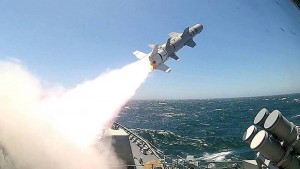 The US government has notified the US Congress of its plans to sell to India 22 anti-ship missiles at an estimated cost of $200 million, saying it would help strengthen the US-India strategic relationship.
The US government has notified the US Congress of its plans to sell to India 22 anti-ship missiles at an estimated cost of $200 million, saying it would help strengthen the US-India strategic relationship.
The Pentagon’s Defence Security Cooperation Agency, which handles foreign arms sales, said it had delivered the required certification notifying Congress of this possible sale following approval of India’s request by the State Department.
India, it said, has requested a possible sale of 12 UGM-84L Harpoon Block II Encapsulated Missiles, 10 UTM-84L Harpoon Encapsulated Training missiles, two Encapsulated Harpoon certification training vehicles, containers, spare and repair parts.
It had also asked for support and test equipment, personnel training and training equipment, publications and technical data, US government and contractor engineering and logistics support services, and other related elements of logistics support. The estimated cost of the whole package is $200 million.
“This proposed sale will contribute to the foreign policy and national security of the United States by helping to strengthen the US-India strategic relationship and to improve the security of an important partner which continues to be an important force for political stability, peace, and economic progress in South Asia,” the Pentagon’s arms sales agency said.
This Harpoon missile system will be employed on the Indian Navy’s Shishumar class submarine (Type-209) and will provide enhanced capabilities in defence of critical sea lines of communication.
India has already purchased Harpoon missiles for integration on Indian Air Force Jaguar aircraft and Indian Navy P-8I maritime patrol aircraft. India will have no difficulty absorbing these additional missiles into its armed forces, the agency said.
“This proposed sale of Harpoon missiles will not alter the basic military balance in the region,” and “there will be no adverse impact on US defence readiness as a result of this proposed sale”, it said.
The principal contractors will be the Boeing Company in St Louis, Missouri; and Delex Systems Inc., in Vienna, Virginia.
In accordance with the Indian defence procurement policy, a contractor may be expected to conclude offset agreements with the Indian government but no offset agreement is currently known to have been proposed in connection with this potential sale, the agency said.